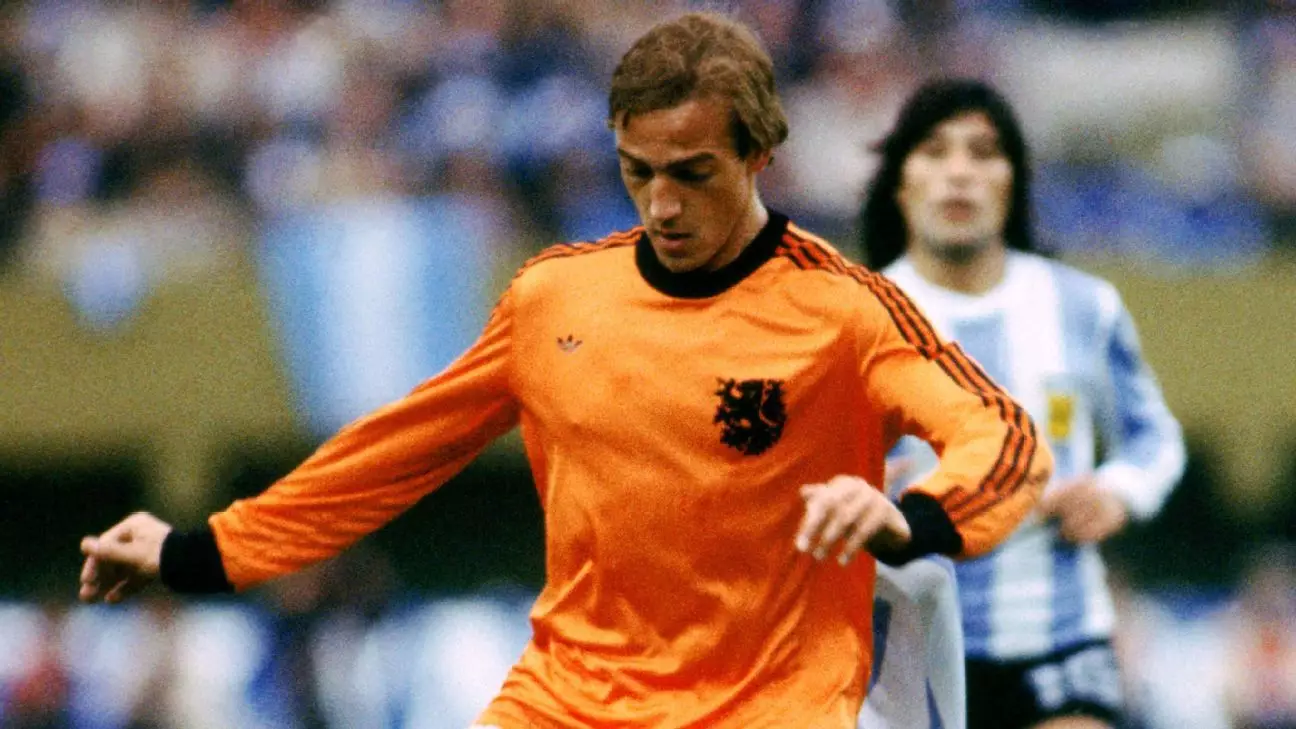The football world has lost one of its luminaries with the passing of Johan Neeskens, a central figure in the Dutch national team during an era marked by unparalleled talent and innovation. Known for his crucial contributions to the celebrated “Clockwork Orange” squad of the 1970s alongside the legendary Johan Cruyff, Neeskens’s death at the age of 73 has left an indelible mark on fans, players, and clubs alike. The announcement of his demise came from the Dutch Football Association (KNVB) as he was fulfilling his role in a coaching initiative in Algeria, a location that reflects his ongoing commitment to nurturing football even after his illustrious playing days.
Neeskens’s death has prompted a wave of mourning across the football community. The KNVB’s heartfelt statement pays tribute not only to his extraordinary talent on the pitch but also to his character off it. They highlighted the dual loss of a gifted athlete and a compassionate individual who touched the lives of those around him. The shared grief among his family, friends, and fans illustrates the profound impact Neeskens had on the sport.
Johan Neeskens’s international career was marked by both extraordinary achievements and heartbreaking near-misses. He faced the daunting task of competing in two back-to-back FIFA World Cup finals, a feat few footballers experience. In the 1974 World Cup, Neeskens was instrumental in the Dutch team’s pursuit of glory, converting a penalty that positioned them ahead against West Germany. However, the team fell short, succumbing to a 2-1 defeat that left an everlasting impression on his career. His reflection on the match poignantly encapsulates the unpredictability of football: “The most beautiful football doesn’t always win.”
This sentiment resonates profoundly, particularly in an age where style often clashes with results. Neeskens’s affirmations about the beauty of the game further solidified his legacy as a player who appreciated not just victories, but the artistry of football. His absence of a World Cup medal does not diminish the respect he earned as a key architect of “total football,” a philosophy that revolutionized the sport and sparked admiration that persists to this day.
Beyond international competitions, Neeskens carved out a phenomenal club career that demonstrated his skill and determination. He was a prominent figure in Ajax’s dominance during the early 1970s, securing three European Cups and showcasing his prowess as a midfielder. This period not only defined Neeskens as a player but also laid the groundwork for future generations of footballers, inspiring them to push the boundaries of teamwork and technique.
After his time at Ajax, he further expanded his legacy with Barcelona and later with the New York Cosmos, among other clubs. His ability to adapt and influence teams in different footballing environments portrayed his versatility and understanding of the game, earning him recognition as a remarkable athlete across various leagues. Football clubs have paid their respects to him, with both Ajax and Barcelona honoring Neeskens’s legacy as a “legend” and a player who would “forever remain in our memory.”
In addition to being an exceptional player, Neeskens contributed to the sport as a coach, sharing his insights on teamwork and collaboration. He famously emphasized that the key to a team’s success lies in unity: “The collective, that’s what it’s all about.” His coaching philosophy mirrored his playing ideology, focusing on the importance of working together rather than individual accolades. This perspective resonates today, as modern football increasingly values team dynamics and shared success.
Neeskens’s legacy transcends mere statistics and accolades; it lies in his character, philosophy, and unwavering dedication to the sport. He not only left behind a treasure trove of memories for fans but also established a benchmark for future footballers aiming to emulate his vision of the game. As the world bids farewell to Johan Neeskens, it honors a figure who represented the very essence of football—the beauty of the game played with heart, soul, and an unyielding commitment to camaraderie. His legacy will echo through generations, reminding us that true champions are defined not only by trophies but by the strength and unity of their collective spirit.

Leave a Reply